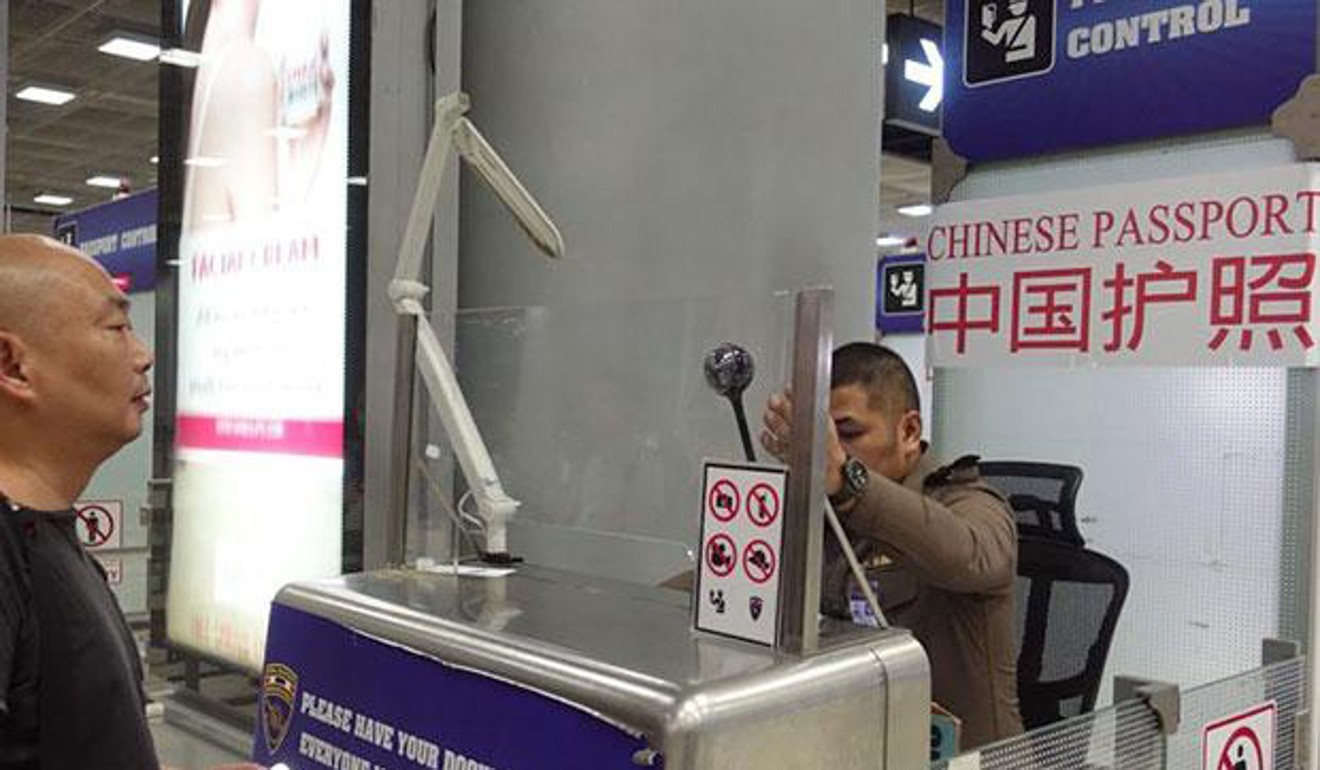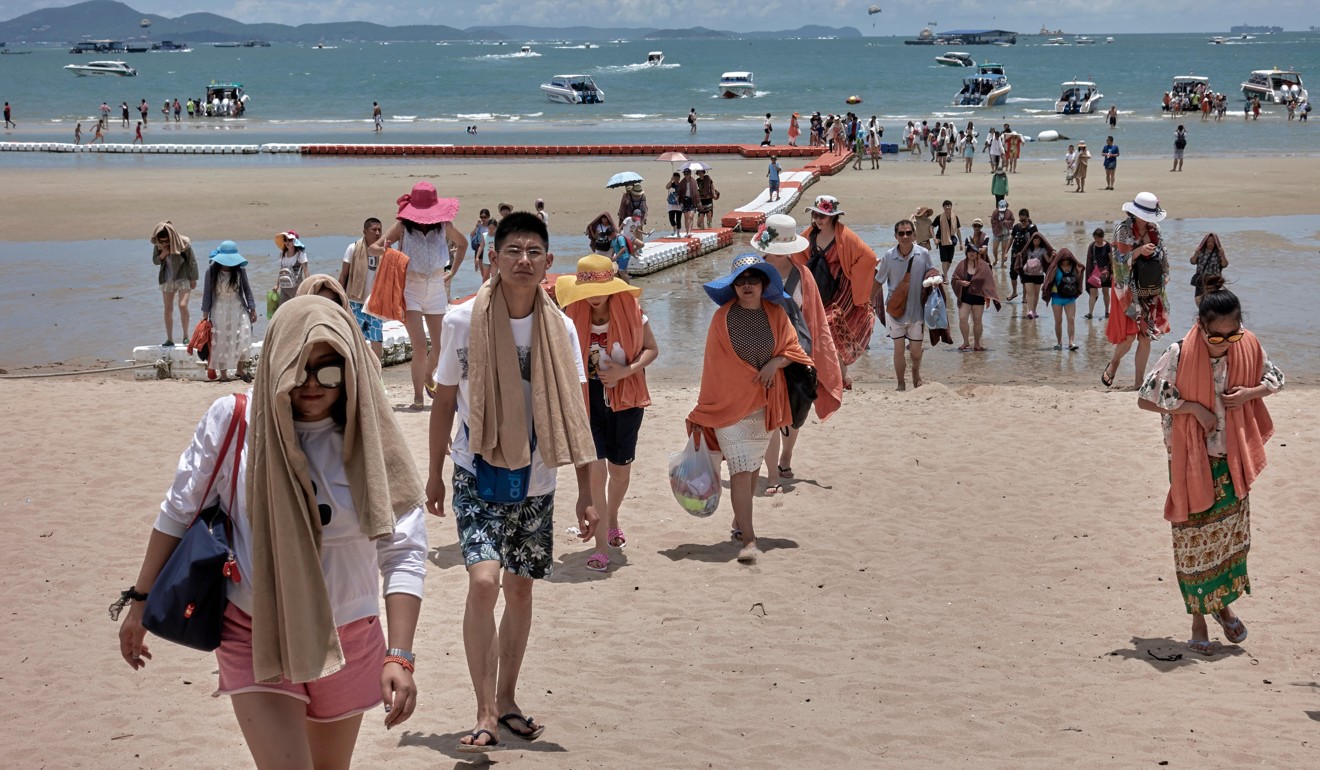
Thailand mulls special visas to lure back Chinese tourists after fatal boat accident and airport slap
The Southeast Asian nation has seen visitor numbers from China fall after the deaths of 47 tourists in July and a security guard’s recent attack on a visitor
The Thai government is trying to arrest the slide in Chinese tourist numbers after a string of controversies, including a boat accident that resulted in dozens of fatalities.
The Association of Thai Travels Agents (ATTA) estimates the number of Chinese tourists dropped by 36 per cent during the recent “golden week” holiday compared with last year.
“We think we are going to lose around 5 per cent of Chinese travellers over the year.”, said Adith Chairattananon, honorary secretary general of the ATTA.
The Thai government is trying specific measures aimed at Chinese tourists and may ease visa rules.
In August, it opened special immigration lanes for Chinese tourists at five airports: the two main airports in Bangkok, Phuket, Chiang Mai and Hat Yai.
The Ministry of Tourism and Sports has also supported a proposal from the ATTA to grant Chinese tourists double-entry visas valid for six months to make it easier for them, a measure that could be approved in the coming weeks.
Safety warning issued to Chinese tourists after drownings in Thailand
“Our ministry is trying to launch this project but it has not been confirmed yet”, said Adith.
The goal is to attract independent and high-end travellers who spend more and benefit local businesses.
Chinese arrivals had been steadily increasing over the first months of 2018, according to figures from the Ministry of Tourism and Sports, and the research division of the Kasikorn Bank had predicted that more 10 million Chinese tourists would visit Thailand this year.
But that momentum was abruptly halted by a boat accident that killed 47 Chinese tourist in July, raising questions about the safety standards in the country.
The crisis was aggravated after Thai Deputy Prime Minister Prawit Wongsuwon described the accident as “entirely Chinese harming Chinese”.
The Thai general added that the boat was owned by a Chinese company that had ignored the warnings about the risk of a major storm.
Tour boat tragedy and airport assault turn Chinese tourists off Thailand
The guard was fired following the incident and a subsequent investigation saw four immigration officials demoted for taking bribes to let Chinese visitors jump the long queues at immigration.
As a result, even though tourist numbers picked up slightly in the two months since the boat accident, they are still way below last year’s, said Wichit Yala, who owns a hotel in the tourist island of Koh Lanta in southern Thailand.
“We registered about 30 per cent fewer Chinese tourists than last year’s Golden Week,” Wichit said.

Tourism is one of the key industries in Thailand, accounting for 12.3 per cent of the country’s GDP in 2016.
China has been increasingly becoming one of main sources of tourist flows. Of the 35.3 million foreign tourists who visited Thailand country last year, 9.8 million were Chinese, the largest group, followed by 3.3 Malaysians and 1.7 million South Koreans.
Thailand became a popular destination among Chinese tourists following the success of Lost in Thailand, a 2012 Chinese comedy film portraying three men travelling in the country.
Thailand says ‘ni hao’ at airports in bid to win back Chinese tourists
The ebb in the number of visitors has other underlying reasons, according to Somnuck Jongmeewasin, a researcher on tourism at the Silpakorn University.
“The yuan has depreciated significantly compared to Thai baht, prompting Chinese tourists to travel less overall this year,” he said.

The relationship between Thailand and Chinese tourists has never been an easy one, though. Even though arrivals increased in the past years, many of the Chinese tourists have been coming through the so-called “zero dollar tour” scheme aimed at budget travellers.
These visitors are lured by low hotel rates, but the packaged tours have prompted complaints that they are then coerced into overspending at various sites after their arrival.
The businesses and staff that benefit from this arrangement are overwhelmingly Chinese, with little or no money going to local companies or workers as a result.
“If I go to China I cannot be a tour guide. But here they are allowed to do it even if it is illegal,” complained a local guide in Pattaya who preferred not to be named.

